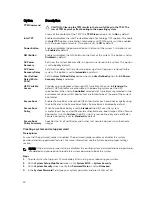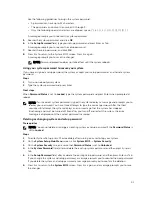
Option
Description
Collaborative CPU
Performance
Control
Enables or disables the CPU power management option. When set to
Enabled
, the
CPU power management is controlled by the OS DBPM and the System DBPM
(DAPC). This option is set to
Disabled
by default.
Memory Patrol
Scrub
Sets the memory patrol scrub frequency. This option is set to
Standard
by default.
Memory Refresh
Rate
Sets the memory refresh rate to either 1x or 2x. This option is set to
1x
by default.
Uncore Frequency
Enables you to select the
Processor Uncore Frequency
option.
Dynamic mode enables the processor to optimize power resources across the
cores and uncore during runtime. The optimization of the uncore frequency to
either save power or optimize performance is influenced by the setting of the
Energy Efficiency Policy
option.
Energy Efficient
Policy
Enables you to select the
Energy Efficient Policy
option.
The CPU uses the setting to manipulate the internal behavior of the processor and
determines whether to target higher performance or better power savings.
Number of Turbo
Boot Enabled
Cores for
Processor 1
NOTE: If there are two processors installed in the system, you see an entry for
Number of Turbo Boost Enabled Cores for Processor 2
.
Controls the number of turbo boost enabled cores for processor 1. The maximum
number of cores is enabled by default.
Monitor/Mwait
Enables the Monitor/Mwait instructions in the processor. This option is set to
Enabled
for all system profiles, except
Custom
by default.
NOTE: This option can be disabled only if the
C States
option in the
Custom
mode is set to
disabled
.
NOTE: When
C States
is set to
Enabled
in the
Custom
mode, changing the
Monitor/Mwait setting does not impact the system power or performance.
Miscellaneous Settings
You can use the
Miscellaneous Settings
screen to perform specific functions such as updating the asset
tag and changing the system date and time.
Viewing Miscellaneous Settings
To view the
Miscellaneous Settings
screen, perform the following steps:
1.
Turn on, or restart your system.
2.
Press F2 immediately after you see the following message:
F2 = System Setup
NOTE: If your operating system begins to load before you press F2, wait for the system to finish
booting, and then restart your system and try again.
3.
On the
System Setup Main Menu
screen, click
System BIOS
.
4.
On the
System BIOS
screen, click
Miscellaneous Settings
.
53
















































